Event Management Analysis: The Pyeongchang Winter Olympics 2018
VerifiedAdded on 2021/05/31
|11
|1880
|166
Report
AI Summary
This report analyzes the Pyeongchang Winter Olympics 2018, held in South Korea. It examines the event's planning, execution, and management, highlighting the bidding process, the formation of the organizing committee, and infrastructure development. The report details the growth stage, including budgeting, marketing, and athlete selection, and the staging stage, covering the torch relay, opening and closing ceremonies, and sports events. It also reviews recommendations for improvement, such as addressing extreme temperatures, the IOC's decision not to sponsor the National Hockey League, and security concerns. The report concludes that the Pyeongchang Olympics were a major success due to effective event management across various stages, involving key stakeholders. The event was well-planned, competently organized, and efficiently executed, reaching a mass audience and conducted with great pomp and show.
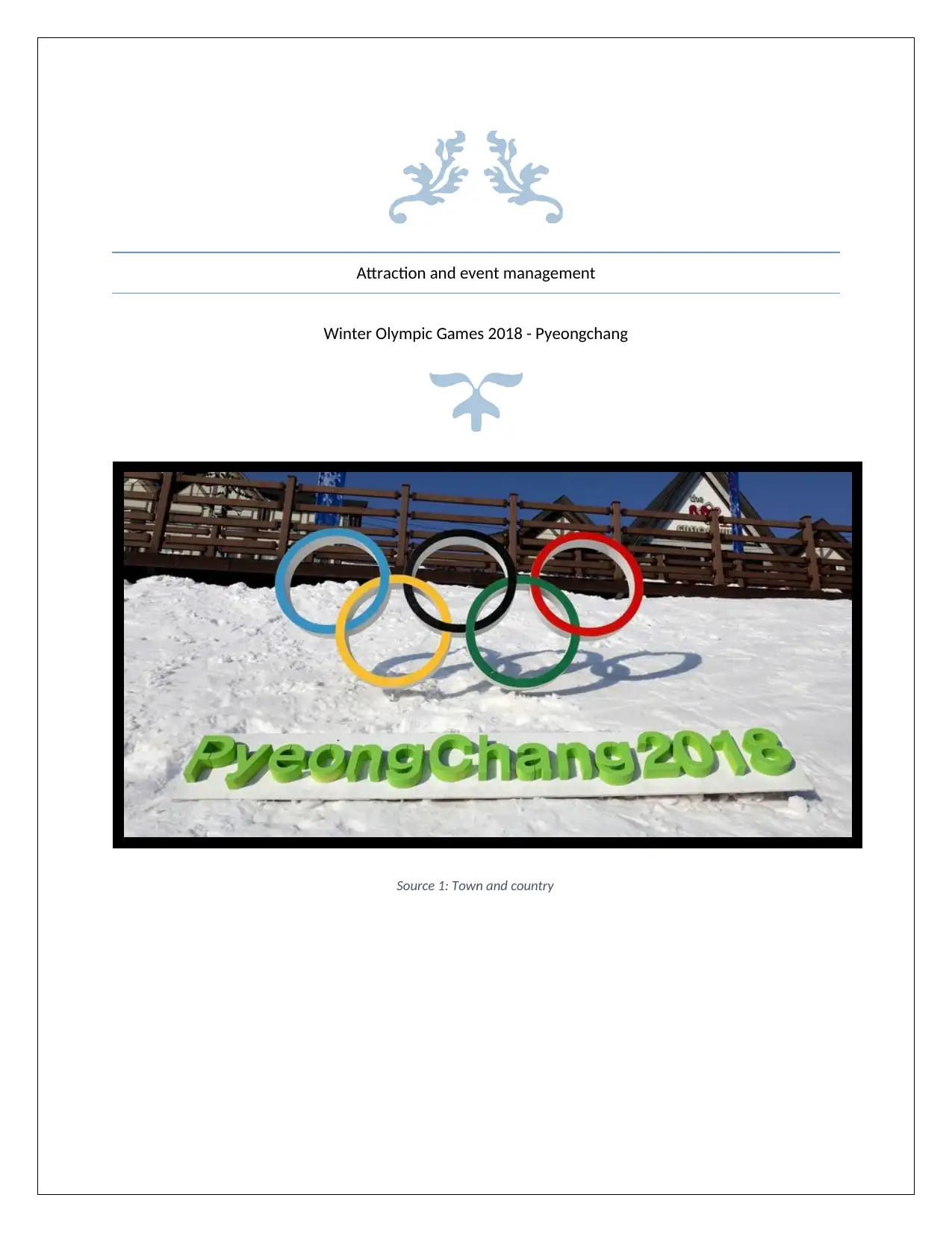
Attraction and event management
Winter Olympic Games 2018 - Pyeongchang
Source 1: Town and country
Winter Olympic Games 2018 - Pyeongchang
Source 1: Town and country
Paraphrase This Document
Need a fresh take? Get an instant paraphrase of this document with our AI Paraphraser
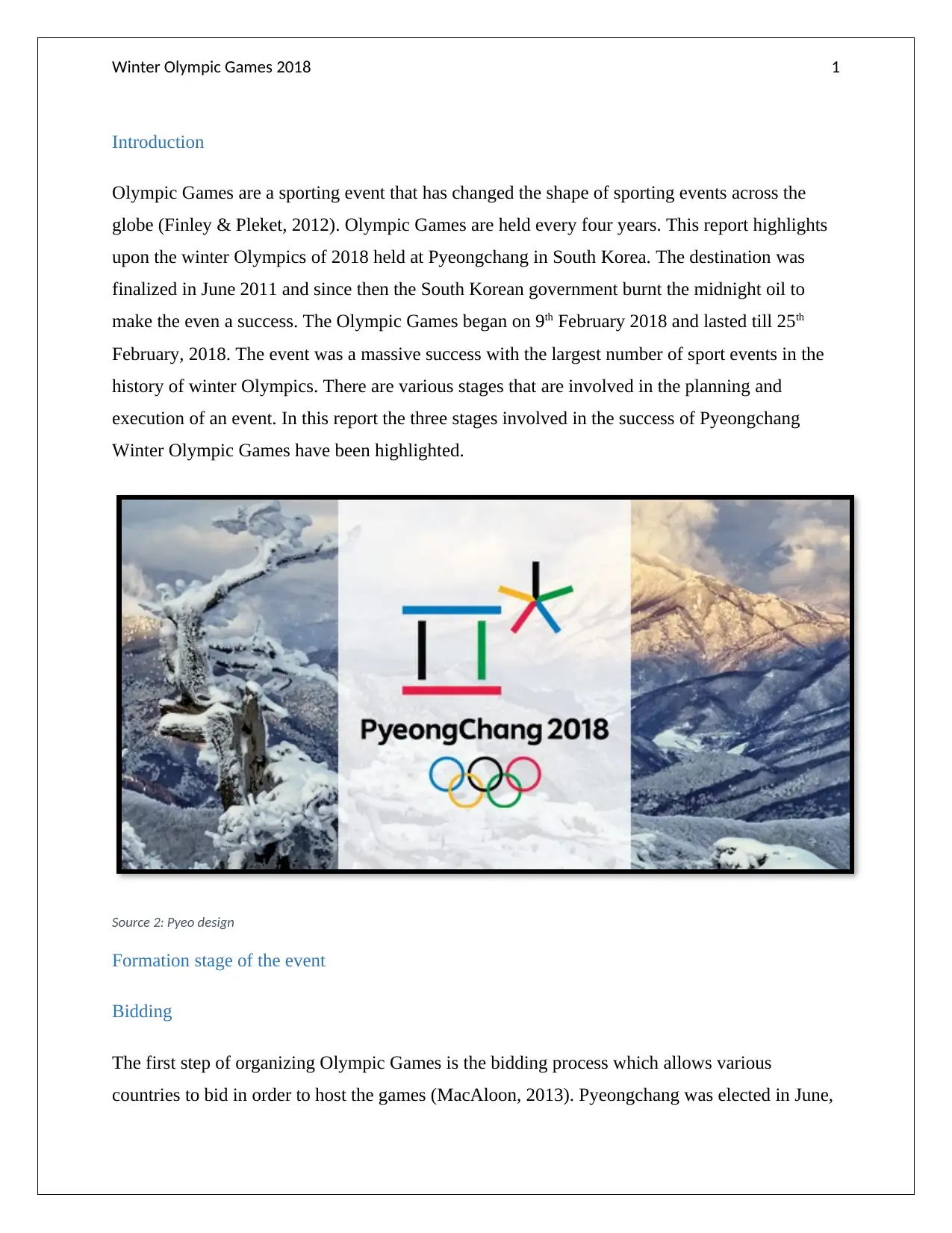
Winter Olympic Games 2018 1
Introduction
Olympic Games are a sporting event that has changed the shape of sporting events across the
globe (Finley & Pleket, 2012). Olympic Games are held every four years. This report highlights
upon the winter Olympics of 2018 held at Pyeongchang in South Korea. The destination was
finalized in June 2011 and since then the South Korean government burnt the midnight oil to
make the even a success. The Olympic Games began on 9th February 2018 and lasted till 25th
February, 2018. The event was a massive success with the largest number of sport events in the
history of winter Olympics. There are various stages that are involved in the planning and
execution of an event. In this report the three stages involved in the success of Pyeongchang
Winter Olympic Games have been highlighted.
Source 2: Pyeo design
Formation stage of the event
Bidding
The first step of organizing Olympic Games is the bidding process which allows various
countries to bid in order to host the games (MacAloon, 2013). Pyeongchang was elected in June,
Introduction
Olympic Games are a sporting event that has changed the shape of sporting events across the
globe (Finley & Pleket, 2012). Olympic Games are held every four years. This report highlights
upon the winter Olympics of 2018 held at Pyeongchang in South Korea. The destination was
finalized in June 2011 and since then the South Korean government burnt the midnight oil to
make the even a success. The Olympic Games began on 9th February 2018 and lasted till 25th
February, 2018. The event was a massive success with the largest number of sport events in the
history of winter Olympics. There are various stages that are involved in the planning and
execution of an event. In this report the three stages involved in the success of Pyeongchang
Winter Olympic Games have been highlighted.
Source 2: Pyeo design
Formation stage of the event
Bidding
The first step of organizing Olympic Games is the bidding process which allows various
countries to bid in order to host the games (MacAloon, 2013). Pyeongchang was elected in June,
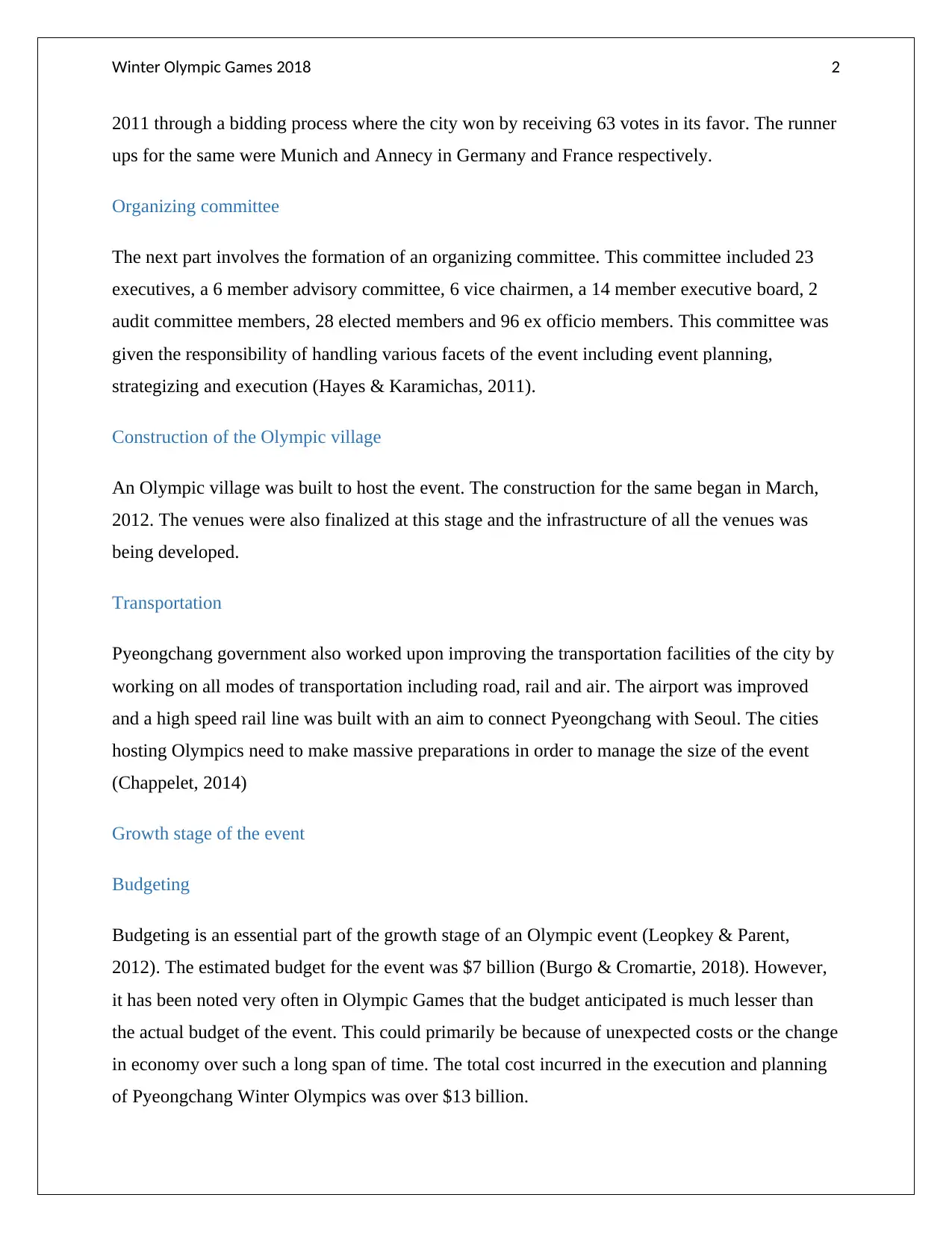
Winter Olympic Games 2018 2
2011 through a bidding process where the city won by receiving 63 votes in its favor. The runner
ups for the same were Munich and Annecy in Germany and France respectively.
Organizing committee
The next part involves the formation of an organizing committee. This committee included 23
executives, a 6 member advisory committee, 6 vice chairmen, a 14 member executive board, 2
audit committee members, 28 elected members and 96 ex officio members. This committee was
given the responsibility of handling various facets of the event including event planning,
strategizing and execution (Hayes & Karamichas, 2011).
Construction of the Olympic village
An Olympic village was built to host the event. The construction for the same began in March,
2012. The venues were also finalized at this stage and the infrastructure of all the venues was
being developed.
Transportation
Pyeongchang government also worked upon improving the transportation facilities of the city by
working on all modes of transportation including road, rail and air. The airport was improved
and a high speed rail line was built with an aim to connect Pyeongchang with Seoul. The cities
hosting Olympics need to make massive preparations in order to manage the size of the event
(Chappelet, 2014)
Growth stage of the event
Budgeting
Budgeting is an essential part of the growth stage of an Olympic event (Leopkey & Parent,
2012). The estimated budget for the event was $7 billion (Burgo & Cromartie, 2018). However,
it has been noted very often in Olympic Games that the budget anticipated is much lesser than
the actual budget of the event. This could primarily be because of unexpected costs or the change
in economy over such a long span of time. The total cost incurred in the execution and planning
of Pyeongchang Winter Olympics was over $13 billion.
2011 through a bidding process where the city won by receiving 63 votes in its favor. The runner
ups for the same were Munich and Annecy in Germany and France respectively.
Organizing committee
The next part involves the formation of an organizing committee. This committee included 23
executives, a 6 member advisory committee, 6 vice chairmen, a 14 member executive board, 2
audit committee members, 28 elected members and 96 ex officio members. This committee was
given the responsibility of handling various facets of the event including event planning,
strategizing and execution (Hayes & Karamichas, 2011).
Construction of the Olympic village
An Olympic village was built to host the event. The construction for the same began in March,
2012. The venues were also finalized at this stage and the infrastructure of all the venues was
being developed.
Transportation
Pyeongchang government also worked upon improving the transportation facilities of the city by
working on all modes of transportation including road, rail and air. The airport was improved
and a high speed rail line was built with an aim to connect Pyeongchang with Seoul. The cities
hosting Olympics need to make massive preparations in order to manage the size of the event
(Chappelet, 2014)
Growth stage of the event
Budgeting
Budgeting is an essential part of the growth stage of an Olympic event (Leopkey & Parent,
2012). The estimated budget for the event was $7 billion (Burgo & Cromartie, 2018). However,
it has been noted very often in Olympic Games that the budget anticipated is much lesser than
the actual budget of the event. This could primarily be because of unexpected costs or the change
in economy over such a long span of time. The total cost incurred in the execution and planning
of Pyeongchang Winter Olympics was over $13 billion.
⊘ This is a preview!⊘
Do you want full access?
Subscribe today to unlock all pages.

Trusted by 1+ million students worldwide
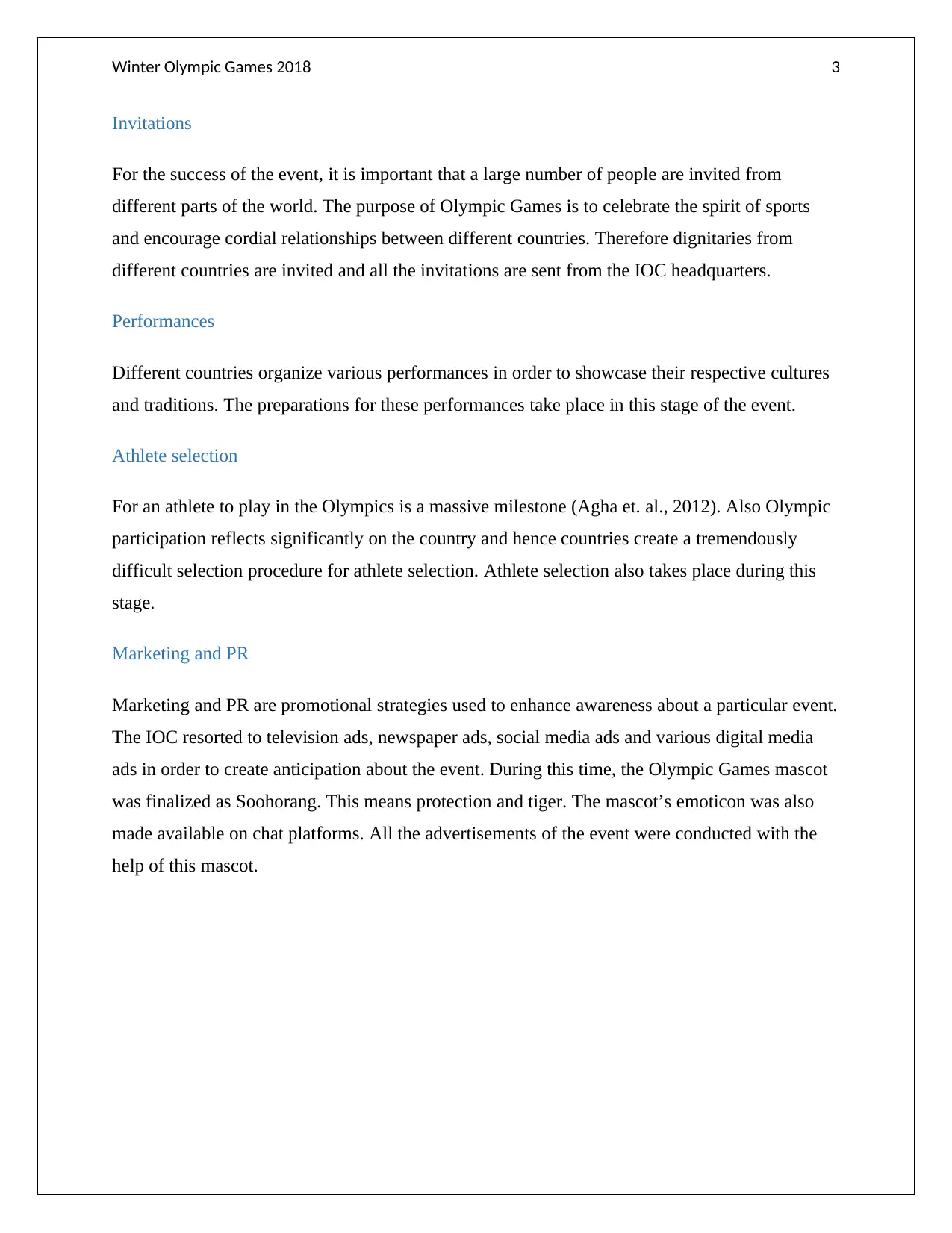
Winter Olympic Games 2018 3
Invitations
For the success of the event, it is important that a large number of people are invited from
different parts of the world. The purpose of Olympic Games is to celebrate the spirit of sports
and encourage cordial relationships between different countries. Therefore dignitaries from
different countries are invited and all the invitations are sent from the IOC headquarters.
Performances
Different countries organize various performances in order to showcase their respective cultures
and traditions. The preparations for these performances take place in this stage of the event.
Athlete selection
For an athlete to play in the Olympics is a massive milestone (Agha et. al., 2012). Also Olympic
participation reflects significantly on the country and hence countries create a tremendously
difficult selection procedure for athlete selection. Athlete selection also takes place during this
stage.
Marketing and PR
Marketing and PR are promotional strategies used to enhance awareness about a particular event.
The IOC resorted to television ads, newspaper ads, social media ads and various digital media
ads in order to create anticipation about the event. During this time, the Olympic Games mascot
was finalized as Soohorang. This means protection and tiger. The mascot’s emoticon was also
made available on chat platforms. All the advertisements of the event were conducted with the
help of this mascot.
Invitations
For the success of the event, it is important that a large number of people are invited from
different parts of the world. The purpose of Olympic Games is to celebrate the spirit of sports
and encourage cordial relationships between different countries. Therefore dignitaries from
different countries are invited and all the invitations are sent from the IOC headquarters.
Performances
Different countries organize various performances in order to showcase their respective cultures
and traditions. The preparations for these performances take place in this stage of the event.
Athlete selection
For an athlete to play in the Olympics is a massive milestone (Agha et. al., 2012). Also Olympic
participation reflects significantly on the country and hence countries create a tremendously
difficult selection procedure for athlete selection. Athlete selection also takes place during this
stage.
Marketing and PR
Marketing and PR are promotional strategies used to enhance awareness about a particular event.
The IOC resorted to television ads, newspaper ads, social media ads and various digital media
ads in order to create anticipation about the event. During this time, the Olympic Games mascot
was finalized as Soohorang. This means protection and tiger. The mascot’s emoticon was also
made available on chat platforms. All the advertisements of the event were conducted with the
help of this mascot.
Paraphrase This Document
Need a fresh take? Get an instant paraphrase of this document with our AI Paraphraser
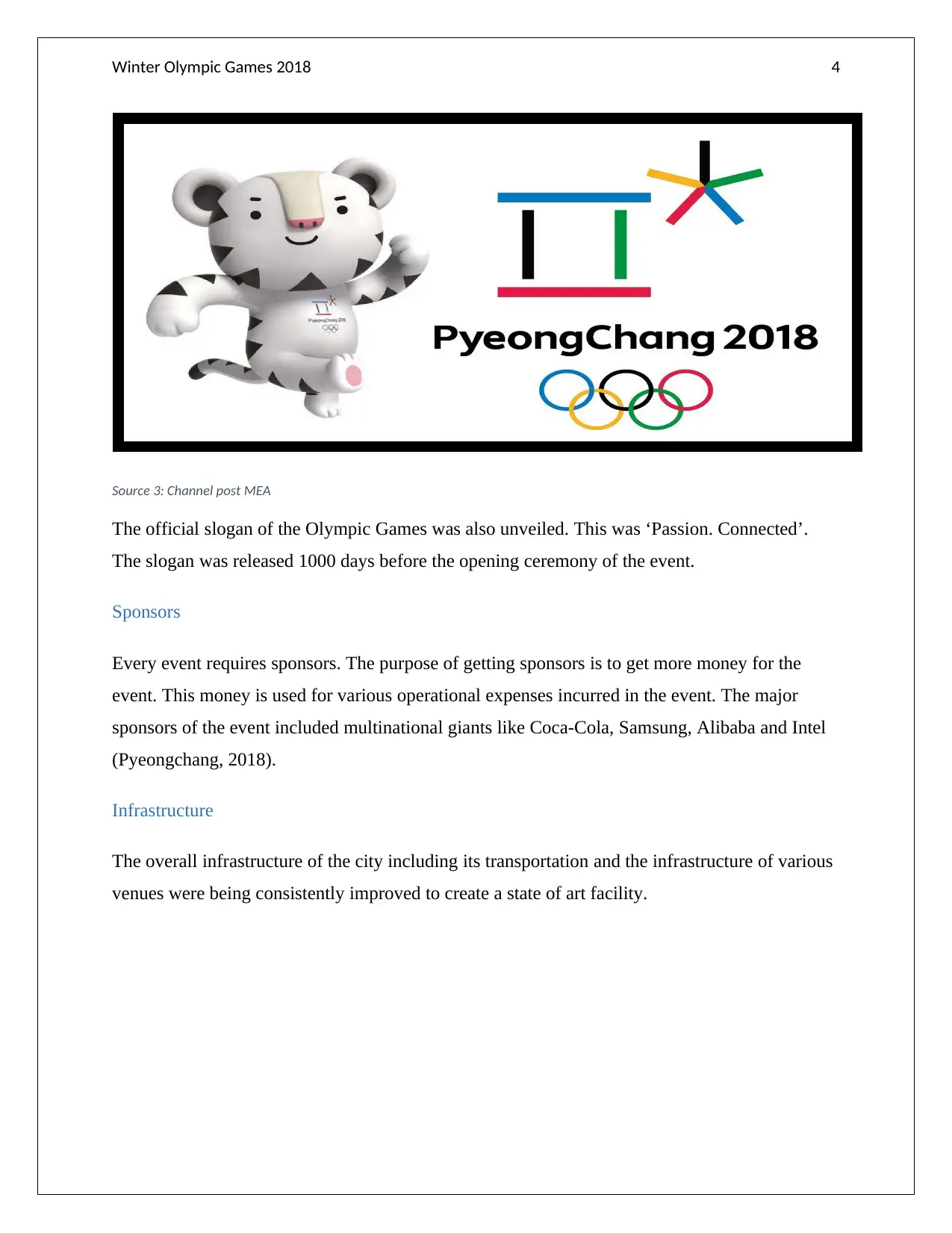
Winter Olympic Games 2018 4
Source 3: Channel post MEA
The official slogan of the Olympic Games was also unveiled. This was ‘Passion. Connected’.
The slogan was released 1000 days before the opening ceremony of the event.
Sponsors
Every event requires sponsors. The purpose of getting sponsors is to get more money for the
event. This money is used for various operational expenses incurred in the event. The major
sponsors of the event included multinational giants like Coca-Cola, Samsung, Alibaba and Intel
(Pyeongchang, 2018).
Infrastructure
The overall infrastructure of the city including its transportation and the infrastructure of various
venues were being consistently improved to create a state of art facility.
Source 3: Channel post MEA
The official slogan of the Olympic Games was also unveiled. This was ‘Passion. Connected’.
The slogan was released 1000 days before the opening ceremony of the event.
Sponsors
Every event requires sponsors. The purpose of getting sponsors is to get more money for the
event. This money is used for various operational expenses incurred in the event. The major
sponsors of the event included multinational giants like Coca-Cola, Samsung, Alibaba and Intel
(Pyeongchang, 2018).
Infrastructure
The overall infrastructure of the city including its transportation and the infrastructure of various
venues were being consistently improved to create a state of art facility.
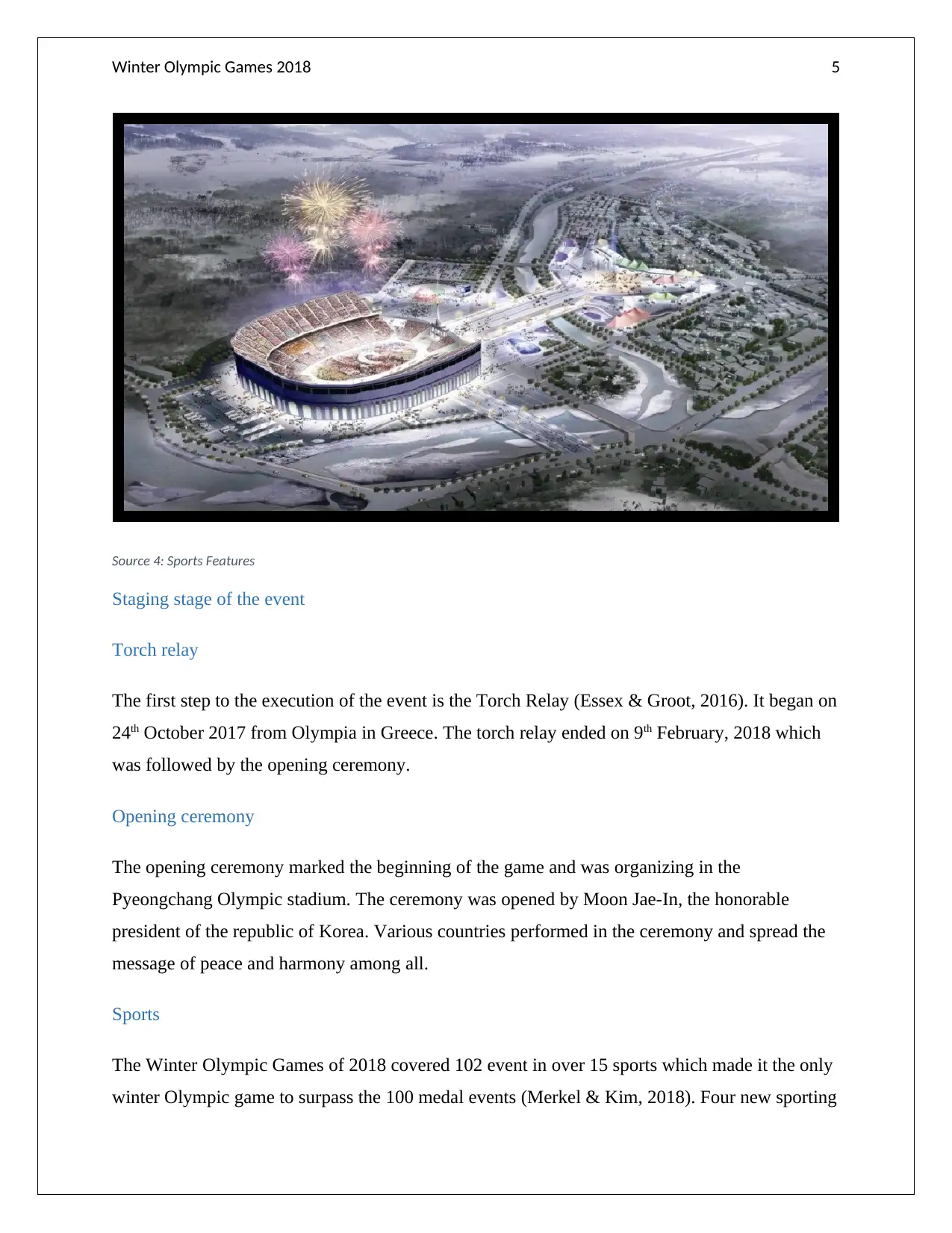
Winter Olympic Games 2018 5
Source 4: Sports Features
Staging stage of the event
Torch relay
The first step to the execution of the event is the Torch Relay (Essex & Groot, 2016). It began on
24th October 2017 from Olympia in Greece. The torch relay ended on 9th February, 2018 which
was followed by the opening ceremony.
Opening ceremony
The opening ceremony marked the beginning of the game and was organizing in the
Pyeongchang Olympic stadium. The ceremony was opened by Moon Jae-In, the honorable
president of the republic of Korea. Various countries performed in the ceremony and spread the
message of peace and harmony among all.
Sports
The Winter Olympic Games of 2018 covered 102 event in over 15 sports which made it the only
winter Olympic game to surpass the 100 medal events (Merkel & Kim, 2018). Four new sporting
Source 4: Sports Features
Staging stage of the event
Torch relay
The first step to the execution of the event is the Torch Relay (Essex & Groot, 2016). It began on
24th October 2017 from Olympia in Greece. The torch relay ended on 9th February, 2018 which
was followed by the opening ceremony.
Opening ceremony
The opening ceremony marked the beginning of the game and was organizing in the
Pyeongchang Olympic stadium. The ceremony was opened by Moon Jae-In, the honorable
president of the republic of Korea. Various countries performed in the ceremony and spread the
message of peace and harmony among all.
Sports
The Winter Olympic Games of 2018 covered 102 event in over 15 sports which made it the only
winter Olympic game to surpass the 100 medal events (Merkel & Kim, 2018). Four new sporting
⊘ This is a preview!⊘
Do you want full access?
Subscribe today to unlock all pages.

Trusted by 1+ million students worldwide
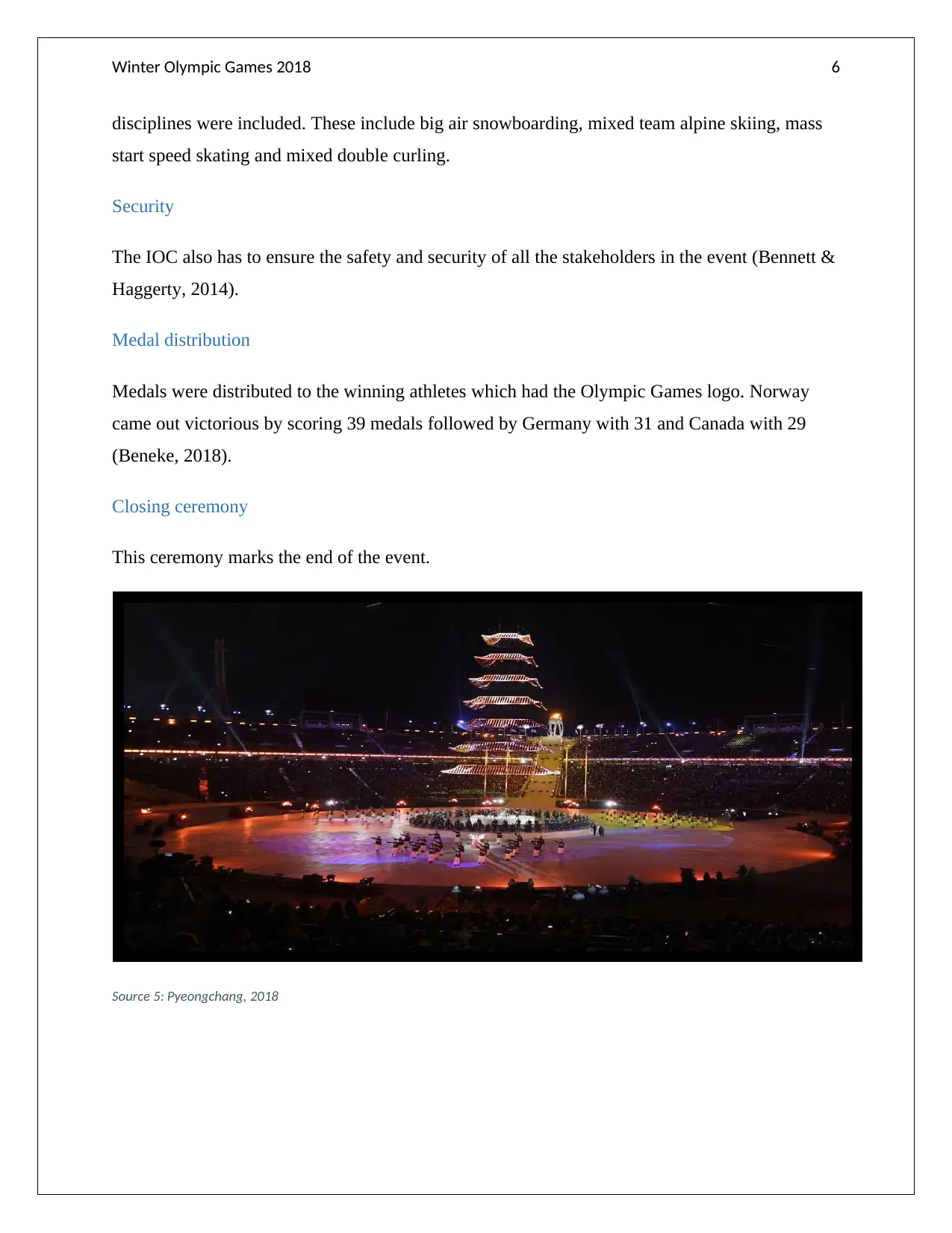
Winter Olympic Games 2018 6
disciplines were included. These include big air snowboarding, mixed team alpine skiing, mass
start speed skating and mixed double curling.
Security
The IOC also has to ensure the safety and security of all the stakeholders in the event (Bennett &
Haggerty, 2014).
Medal distribution
Medals were distributed to the winning athletes which had the Olympic Games logo. Norway
came out victorious by scoring 39 medals followed by Germany with 31 and Canada with 29
(Beneke, 2018).
Closing ceremony
This ceremony marks the end of the event.
Source 5: Pyeongchang, 2018
disciplines were included. These include big air snowboarding, mixed team alpine skiing, mass
start speed skating and mixed double curling.
Security
The IOC also has to ensure the safety and security of all the stakeholders in the event (Bennett &
Haggerty, 2014).
Medal distribution
Medals were distributed to the winning athletes which had the Olympic Games logo. Norway
came out victorious by scoring 39 medals followed by Germany with 31 and Canada with 29
(Beneke, 2018).
Closing ceremony
This ceremony marks the end of the event.
Source 5: Pyeongchang, 2018
Paraphrase This Document
Need a fresh take? Get an instant paraphrase of this document with our AI Paraphraser
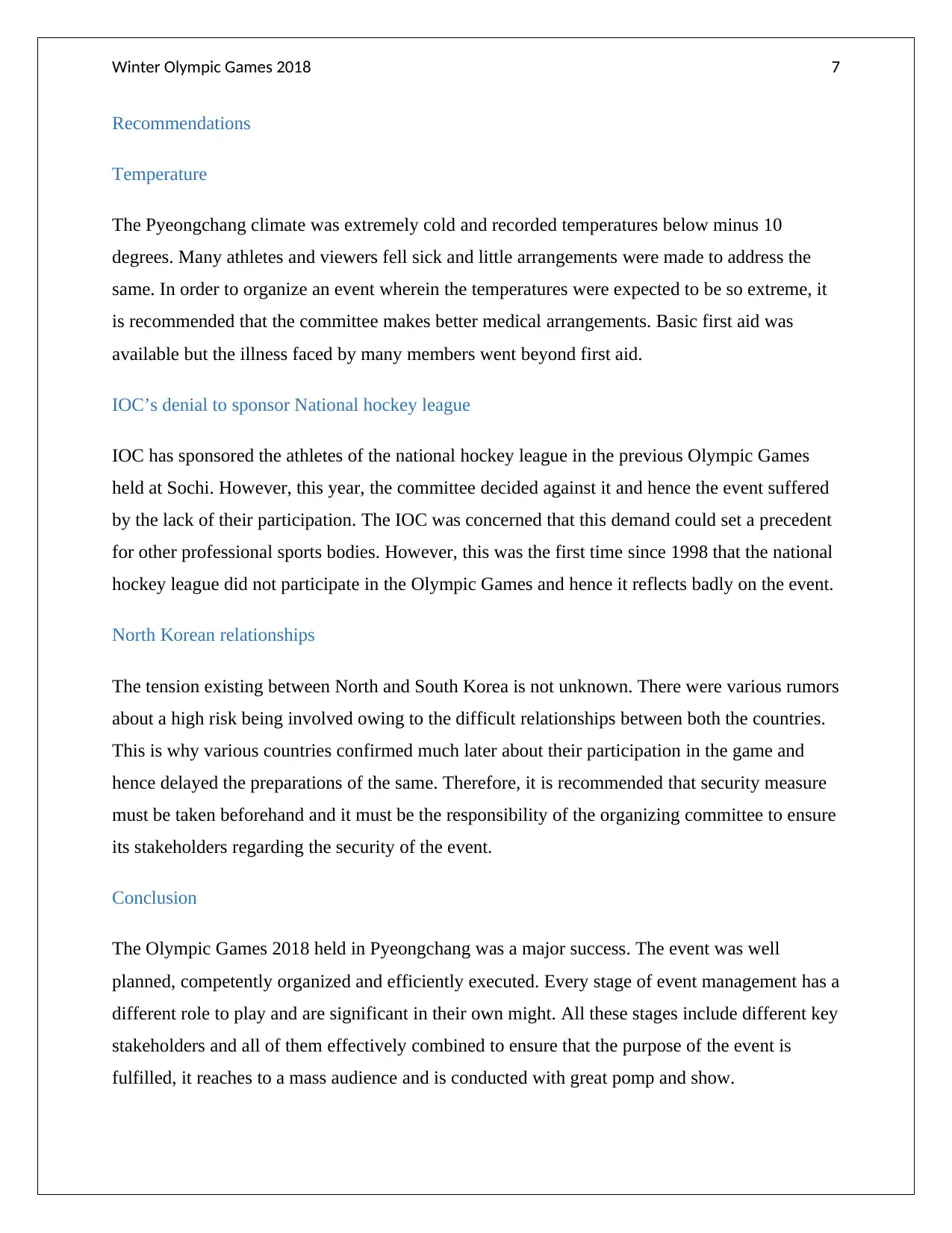
Winter Olympic Games 2018 7
Recommendations
Temperature
The Pyeongchang climate was extremely cold and recorded temperatures below minus 10
degrees. Many athletes and viewers fell sick and little arrangements were made to address the
same. In order to organize an event wherein the temperatures were expected to be so extreme, it
is recommended that the committee makes better medical arrangements. Basic first aid was
available but the illness faced by many members went beyond first aid.
IOC’s denial to sponsor National hockey league
IOC has sponsored the athletes of the national hockey league in the previous Olympic Games
held at Sochi. However, this year, the committee decided against it and hence the event suffered
by the lack of their participation. The IOC was concerned that this demand could set a precedent
for other professional sports bodies. However, this was the first time since 1998 that the national
hockey league did not participate in the Olympic Games and hence it reflects badly on the event.
North Korean relationships
The tension existing between North and South Korea is not unknown. There were various rumors
about a high risk being involved owing to the difficult relationships between both the countries.
This is why various countries confirmed much later about their participation in the game and
hence delayed the preparations of the same. Therefore, it is recommended that security measure
must be taken beforehand and it must be the responsibility of the organizing committee to ensure
its stakeholders regarding the security of the event.
Conclusion
The Olympic Games 2018 held in Pyeongchang was a major success. The event was well
planned, competently organized and efficiently executed. Every stage of event management has a
different role to play and are significant in their own might. All these stages include different key
stakeholders and all of them effectively combined to ensure that the purpose of the event is
fulfilled, it reaches to a mass audience and is conducted with great pomp and show.
Recommendations
Temperature
The Pyeongchang climate was extremely cold and recorded temperatures below minus 10
degrees. Many athletes and viewers fell sick and little arrangements were made to address the
same. In order to organize an event wherein the temperatures were expected to be so extreme, it
is recommended that the committee makes better medical arrangements. Basic first aid was
available but the illness faced by many members went beyond first aid.
IOC’s denial to sponsor National hockey league
IOC has sponsored the athletes of the national hockey league in the previous Olympic Games
held at Sochi. However, this year, the committee decided against it and hence the event suffered
by the lack of their participation. The IOC was concerned that this demand could set a precedent
for other professional sports bodies. However, this was the first time since 1998 that the national
hockey league did not participate in the Olympic Games and hence it reflects badly on the event.
North Korean relationships
The tension existing between North and South Korea is not unknown. There were various rumors
about a high risk being involved owing to the difficult relationships between both the countries.
This is why various countries confirmed much later about their participation in the game and
hence delayed the preparations of the same. Therefore, it is recommended that security measure
must be taken beforehand and it must be the responsibility of the organizing committee to ensure
its stakeholders regarding the security of the event.
Conclusion
The Olympic Games 2018 held in Pyeongchang was a major success. The event was well
planned, competently organized and efficiently executed. Every stage of event management has a
different role to play and are significant in their own might. All these stages include different key
stakeholders and all of them effectively combined to ensure that the purpose of the event is
fulfilled, it reaches to a mass audience and is conducted with great pomp and show.

Winter Olympic Games 2018 8
⊘ This is a preview!⊘
Do you want full access?
Subscribe today to unlock all pages.

Trusted by 1+ million students worldwide
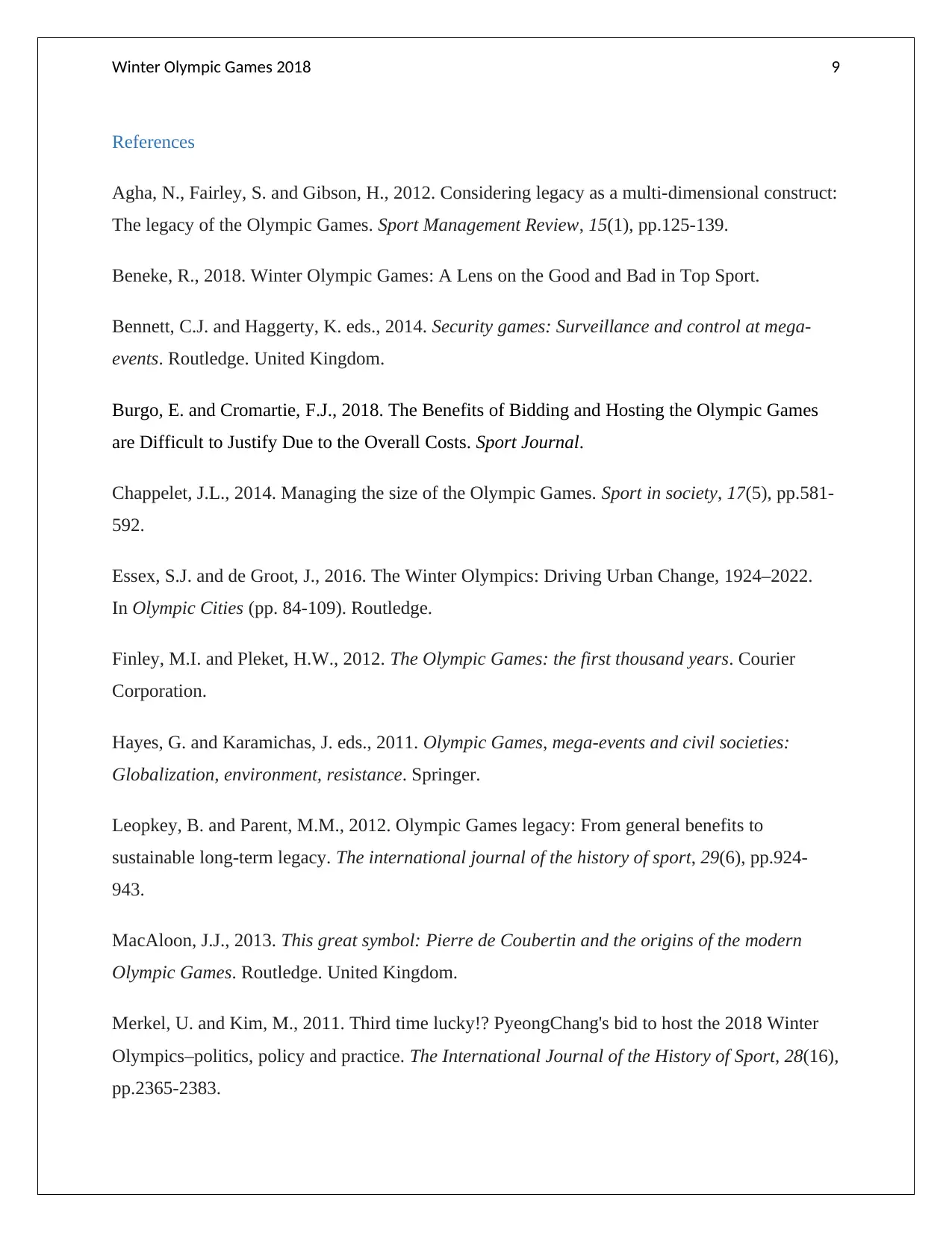
Winter Olympic Games 2018 9
References
Agha, N., Fairley, S. and Gibson, H., 2012. Considering legacy as a multi-dimensional construct:
The legacy of the Olympic Games. Sport Management Review, 15(1), pp.125-139.
Beneke, R., 2018. Winter Olympic Games: A Lens on the Good and Bad in Top Sport.
Bennett, C.J. and Haggerty, K. eds., 2014. Security games: Surveillance and control at mega-
events. Routledge. United Kingdom.
Burgo, E. and Cromartie, F.J., 2018. The Benefits of Bidding and Hosting the Olympic Games
are Difficult to Justify Due to the Overall Costs. Sport Journal.
Chappelet, J.L., 2014. Managing the size of the Olympic Games. Sport in society, 17(5), pp.581-
592.
Essex, S.J. and de Groot, J., 2016. The Winter Olympics: Driving Urban Change, 1924–2022.
In Olympic Cities (pp. 84-109). Routledge.
Finley, M.I. and Pleket, H.W., 2012. The Olympic Games: the first thousand years. Courier
Corporation.
Hayes, G. and Karamichas, J. eds., 2011. Olympic Games, mega-events and civil societies:
Globalization, environment, resistance. Springer.
Leopkey, B. and Parent, M.M., 2012. Olympic Games legacy: From general benefits to
sustainable long-term legacy. The international journal of the history of sport, 29(6), pp.924-
943.
MacAloon, J.J., 2013. This great symbol: Pierre de Coubertin and the origins of the modern
Olympic Games. Routledge. United Kingdom.
Merkel, U. and Kim, M., 2011. Third time lucky!? PyeongChang's bid to host the 2018 Winter
Olympics–politics, policy and practice. The International Journal of the History of Sport, 28(16),
pp.2365-2383.
References
Agha, N., Fairley, S. and Gibson, H., 2012. Considering legacy as a multi-dimensional construct:
The legacy of the Olympic Games. Sport Management Review, 15(1), pp.125-139.
Beneke, R., 2018. Winter Olympic Games: A Lens on the Good and Bad in Top Sport.
Bennett, C.J. and Haggerty, K. eds., 2014. Security games: Surveillance and control at mega-
events. Routledge. United Kingdom.
Burgo, E. and Cromartie, F.J., 2018. The Benefits of Bidding and Hosting the Olympic Games
are Difficult to Justify Due to the Overall Costs. Sport Journal.
Chappelet, J.L., 2014. Managing the size of the Olympic Games. Sport in society, 17(5), pp.581-
592.
Essex, S.J. and de Groot, J., 2016. The Winter Olympics: Driving Urban Change, 1924–2022.
In Olympic Cities (pp. 84-109). Routledge.
Finley, M.I. and Pleket, H.W., 2012. The Olympic Games: the first thousand years. Courier
Corporation.
Hayes, G. and Karamichas, J. eds., 2011. Olympic Games, mega-events and civil societies:
Globalization, environment, resistance. Springer.
Leopkey, B. and Parent, M.M., 2012. Olympic Games legacy: From general benefits to
sustainable long-term legacy. The international journal of the history of sport, 29(6), pp.924-
943.
MacAloon, J.J., 2013. This great symbol: Pierre de Coubertin and the origins of the modern
Olympic Games. Routledge. United Kingdom.
Merkel, U. and Kim, M., 2011. Third time lucky!? PyeongChang's bid to host the 2018 Winter
Olympics–politics, policy and practice. The International Journal of the History of Sport, 28(16),
pp.2365-2383.
Paraphrase This Document
Need a fresh take? Get an instant paraphrase of this document with our AI Paraphraser

Winter Olympic Games 2018 10
Pyeongchang, 2018, ‘About Partners’. Available at
https://www.pyeongchang2018.com/en/partners. Retrieved on 16 May, 2018.
Pyeongchang, 2018, ‘About Partners’. Available at
https://www.pyeongchang2018.com/en/partners. Retrieved on 16 May, 2018.
1 out of 11
Related Documents
Your All-in-One AI-Powered Toolkit for Academic Success.
+13062052269
info@desklib.com
Available 24*7 on WhatsApp / Email
![[object Object]](/_next/static/media/star-bottom.7253800d.svg)
Unlock your academic potential
Copyright © 2020–2026 A2Z Services. All Rights Reserved. Developed and managed by ZUCOL.





